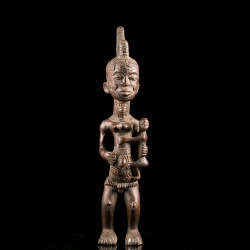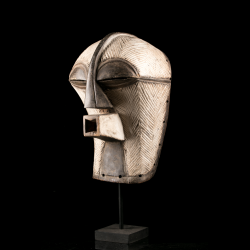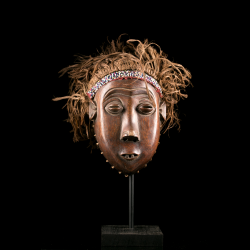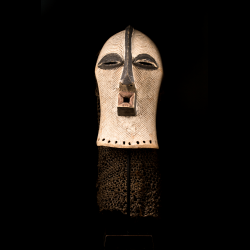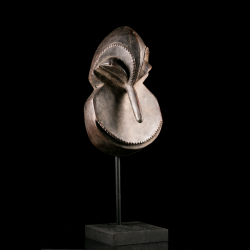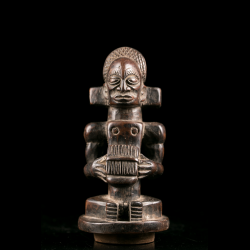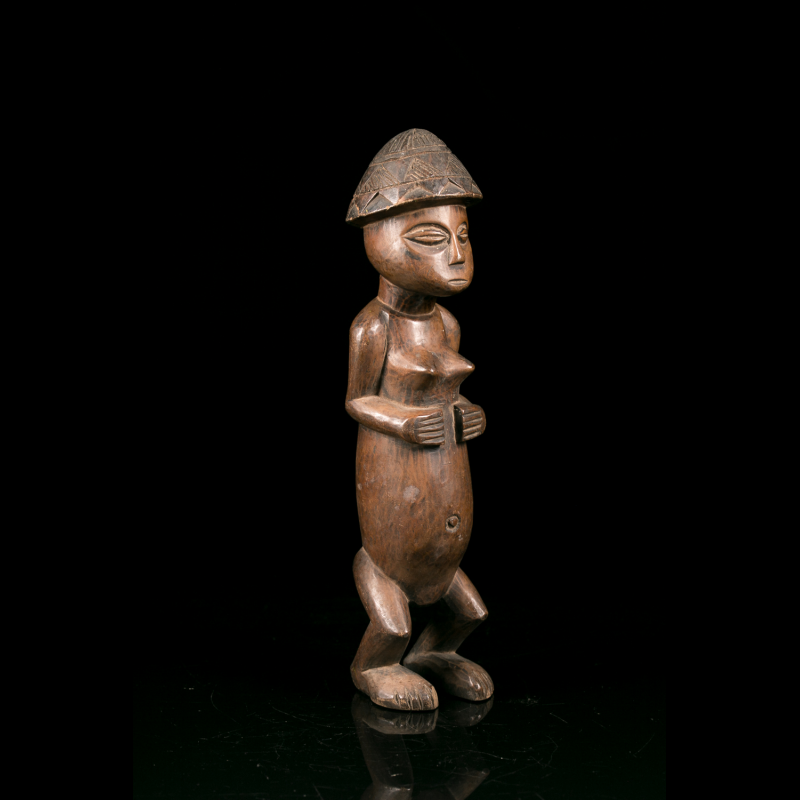


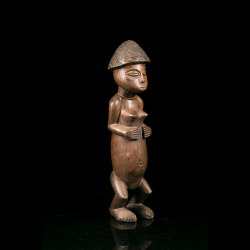







The anthropomorphic female figures of the Lwena people from Angola are traditional sculptures that play a central role in the culture and rituals of the Lwena, an ethnic group in the region. Here are some key points about these figures:
Refined style and aesthetics:
The Lwena figures are distinguished by their elegant and often streamlined style. The facial features are often stylized and their proportions can be exaggerated to highlight certain characteristics.
History and tradition:
These sculptures have a long history among the Lwena, dating back generations. They often represent ancestors, spirits, or important mythological figures in the Lwena cosmology. Each figure can have a specific story or be associated with a particular event in the history of the Lwena people.
Significance and symbolism:
The anthropomorphic Lwena figures are rich in symbolism. They embody the collective memory of the Lwena people, recalling the traditions, values, and teachings passed down through generations. They can also symbolize fertility, protection, healing, or other important aspects of daily and spiritual life.
Ritual uses:
These sculptures are often used in important rituals such as coming-of-age ceremonies, weddings, healing rites, and community festivals. They serve as a link between the world of the living and the ancestral spirits, playing a crucial role in communicating with the spiritual world and maintaining social harmony.
Contemporary resonance:
Although these sculptures are deeply rooted in tradition, they continue to have contemporary significance among the Lwena. They are sometimes collected and displayed in museums and art galleries, thus helping to preserve and promote the cultural and artistic heritage of the Lwena at both the national and international levels.
In summary, the anthropomorphic female figures of the Lwena from Angola represent a unique artistic and cultural expression, closely linked to the identity and spirituality of the Lwena people. Their refined beauty and profound symbolism make them objects of great cultural and historical value.
Data sheet

The anthropomorphic female figures of the Lwena people from Angola are traditional sculptures that play a central role in the culture and rituals of the Lwena, an ethnic group in the region. Here are some key points about these figures:
Refined style and aesthetics:
The Lwena figures are distinguished by their elegant and often streamlined style. The facial features are often stylized and their proportions can be exaggerated to highlight certain characteristics.
History and tradition:
These sculptures have a long history among the Lwena, dating back generations. They often represent ancestors, spirits, or important mythological figures in the Lwena cosmology. Each figure can have a specific story or be associated with a particular event in the history of the Lwena people.
Significance and symbolism:
The anthropomorphic Lwena figures are rich in symbolism. They embody the collective memory of the Lwena people, recalling the traditions, values, and teachings passed down through generations. They can also symbolize fertility, protection, healing, or other important aspects of daily and spiritual life.
Ritual uses:
These sculptures are often used in important rituals such as coming-of-age ceremonies, weddings, healing rites, and community festivals. They serve as a link between the world of the living and the ancestral spirits, playing a crucial role in communicating with the spiritual world and maintaining social harmony.
Contemporary resonance:
Although these sculptures are deeply rooted in tradition, they continue to have contemporary significance among the Lwena. They are sometimes collected and displayed in museums and art galleries, thus helping to preserve and promote the cultural and artistic heritage of the Lwena at both the national and international levels.
In summary, the anthropomorphic female figures of the Lwena from Angola represent a unique artistic and cultural expression, closely linked to the identity and spirituality of the Lwena people. Their refined beauty and profound symbolism make them objects of great cultural and historical value.
